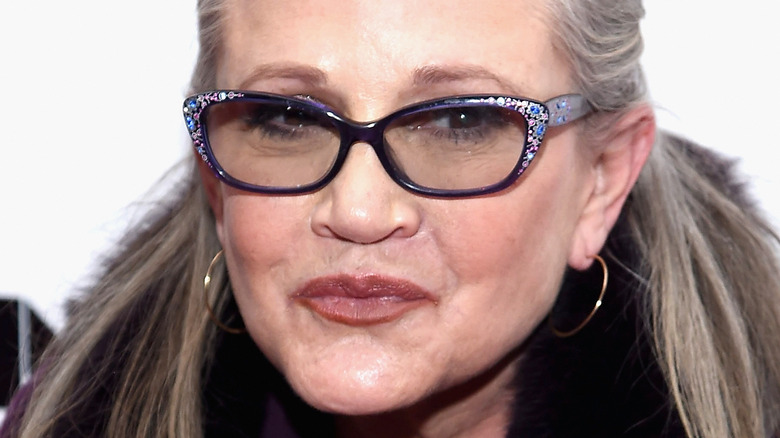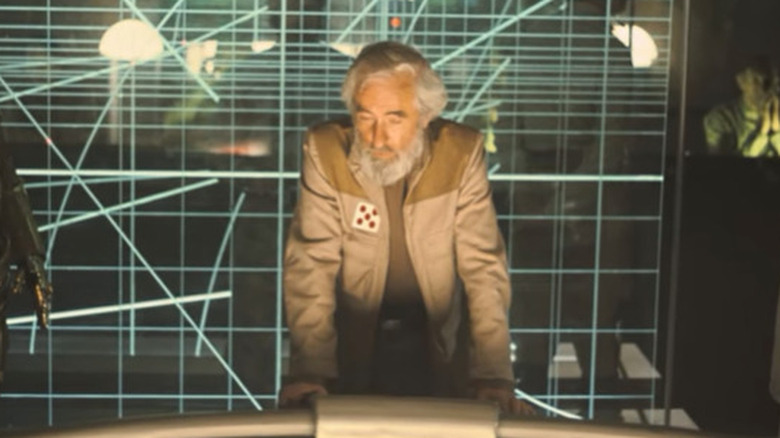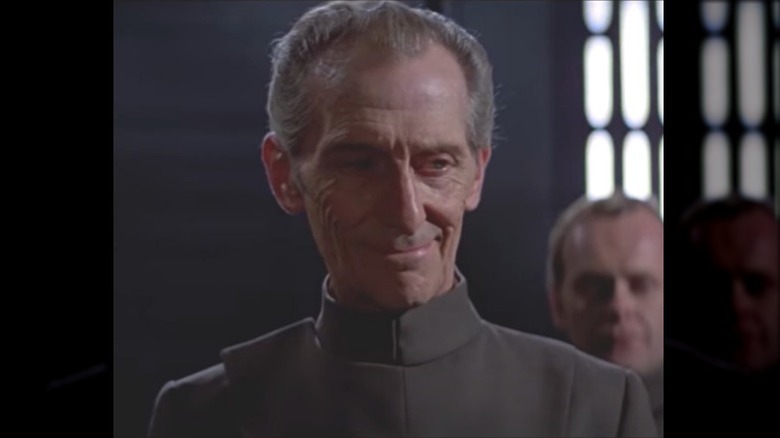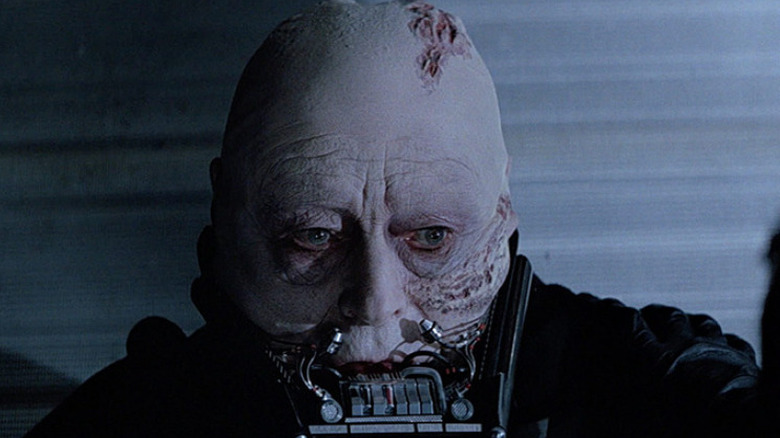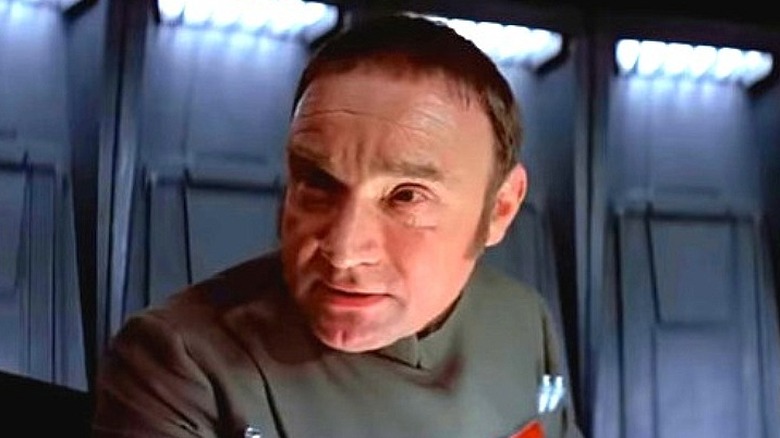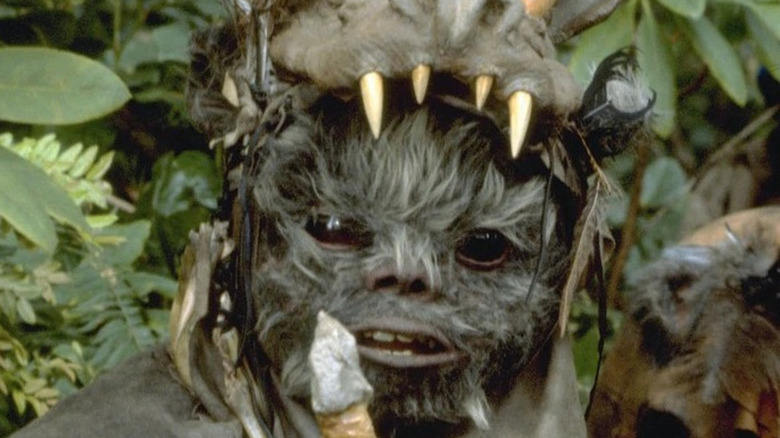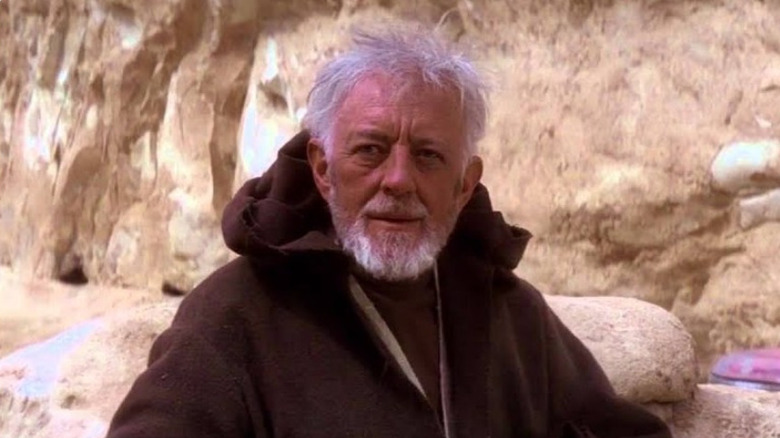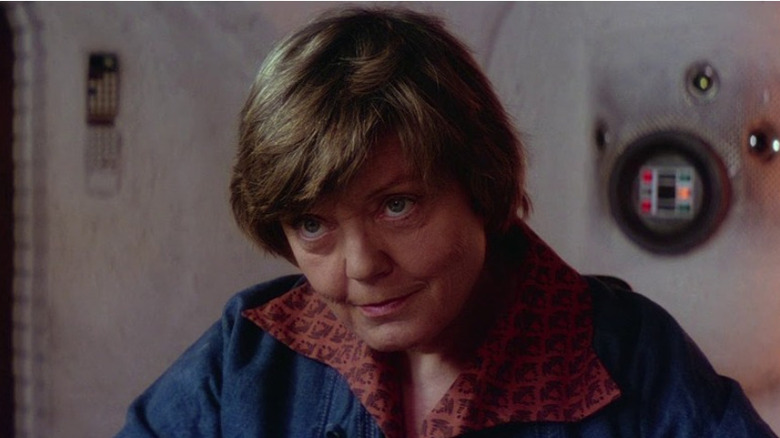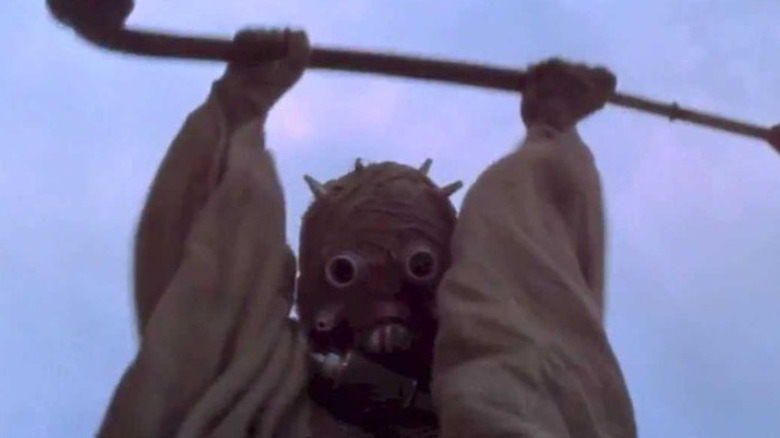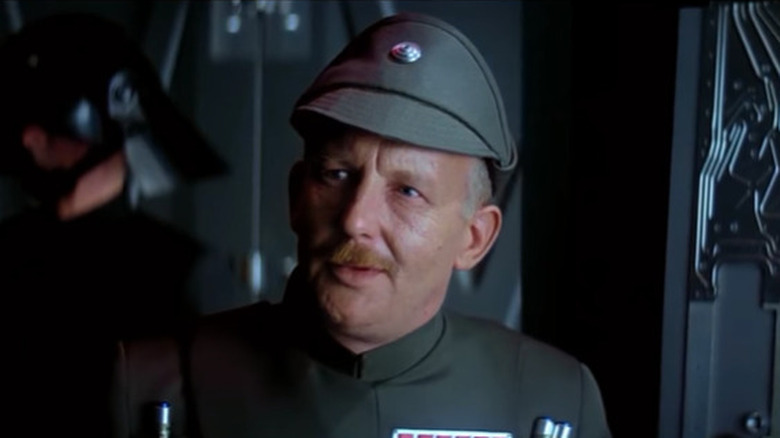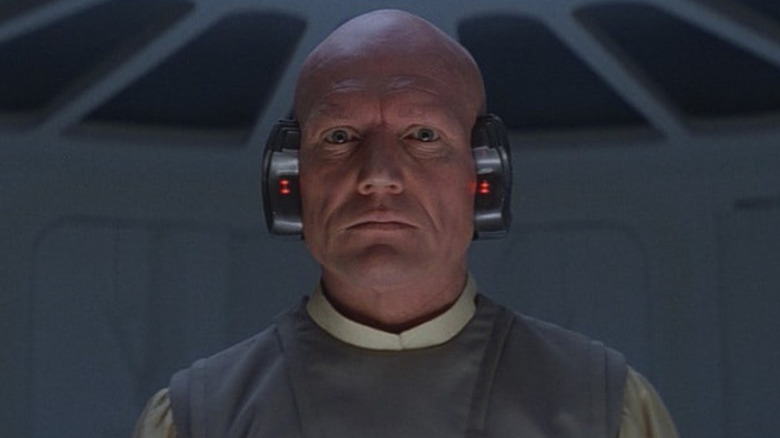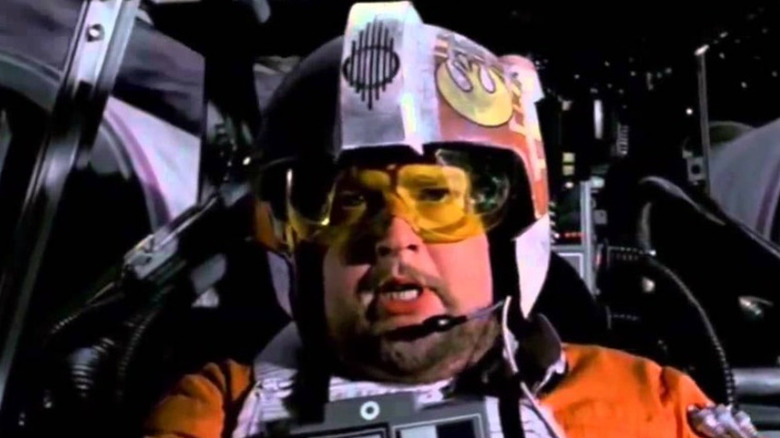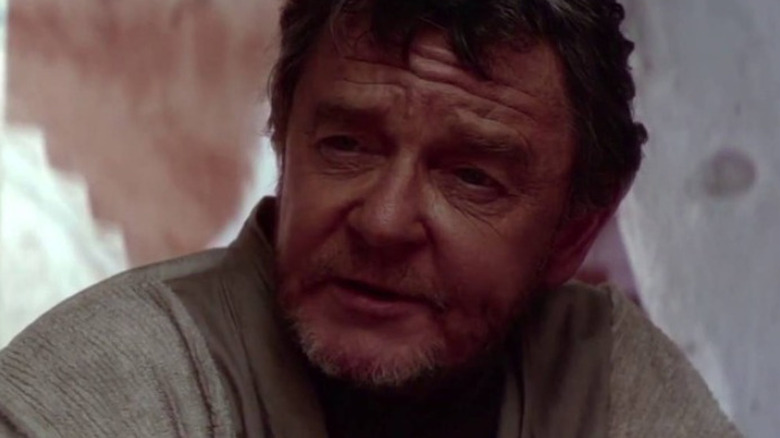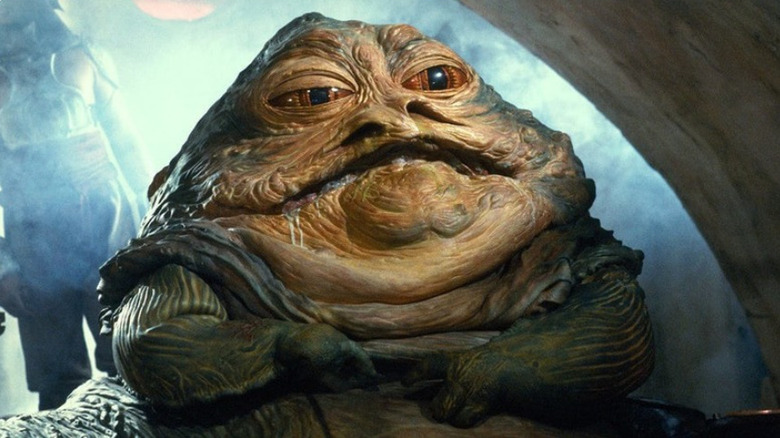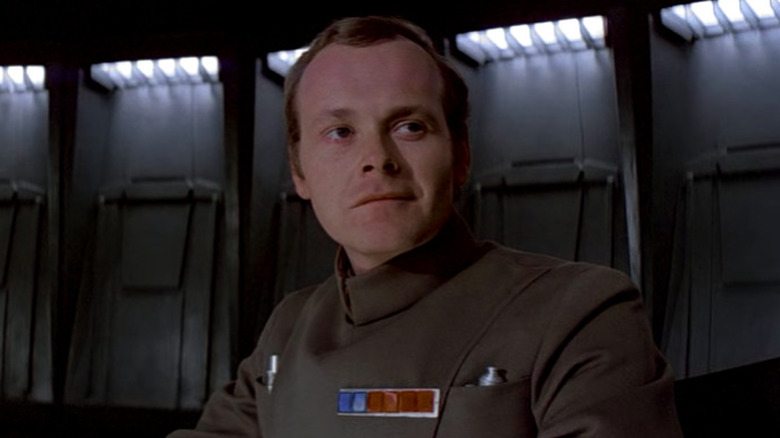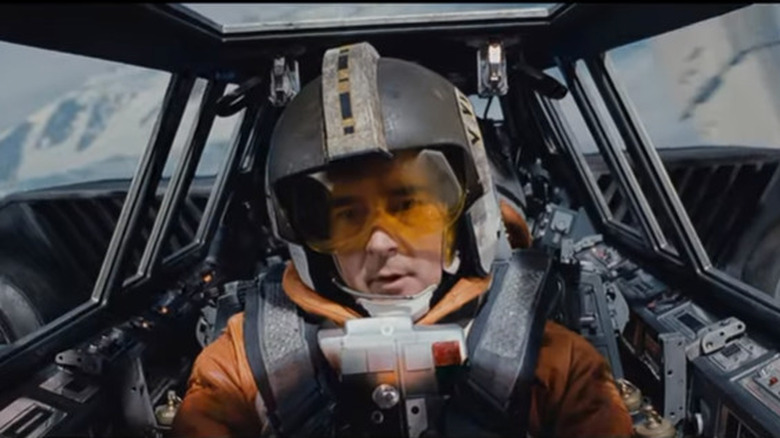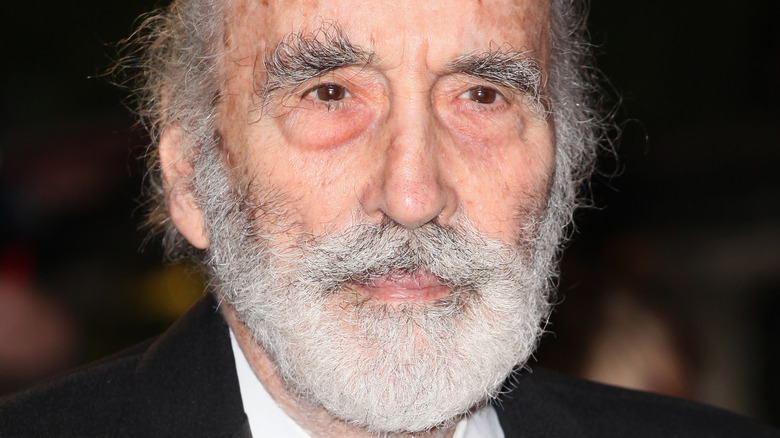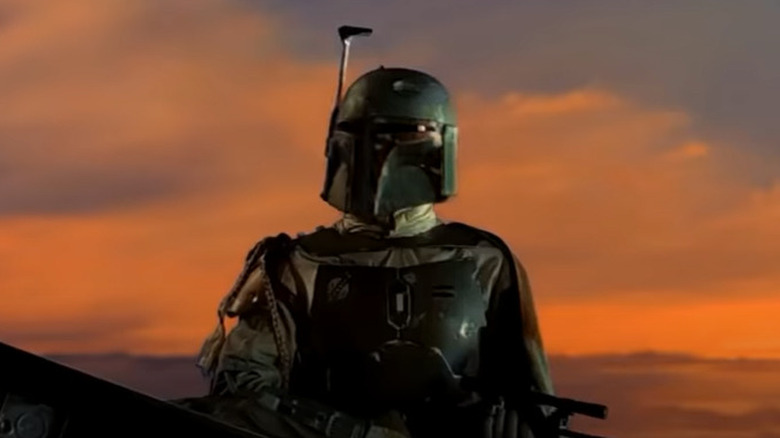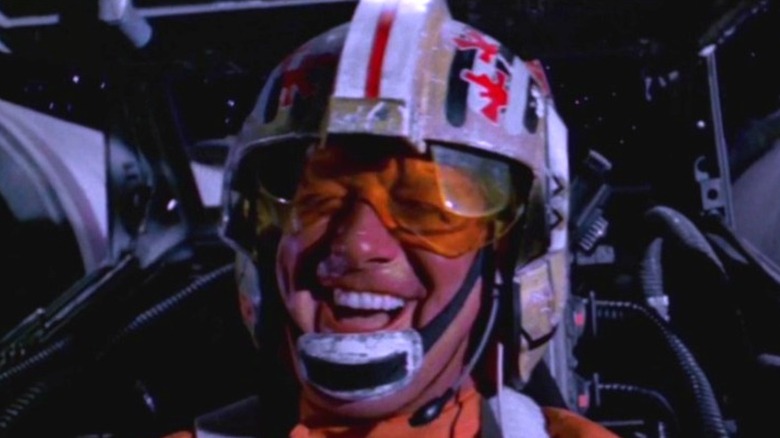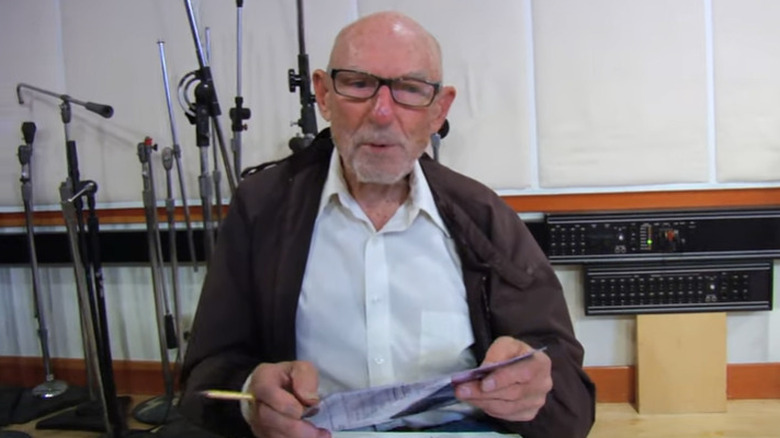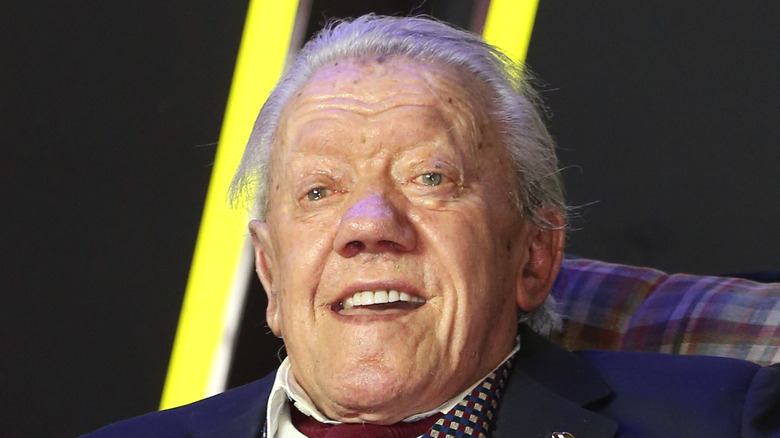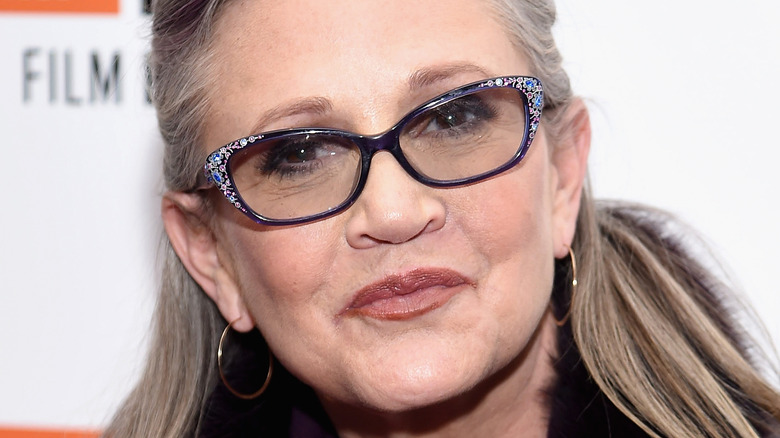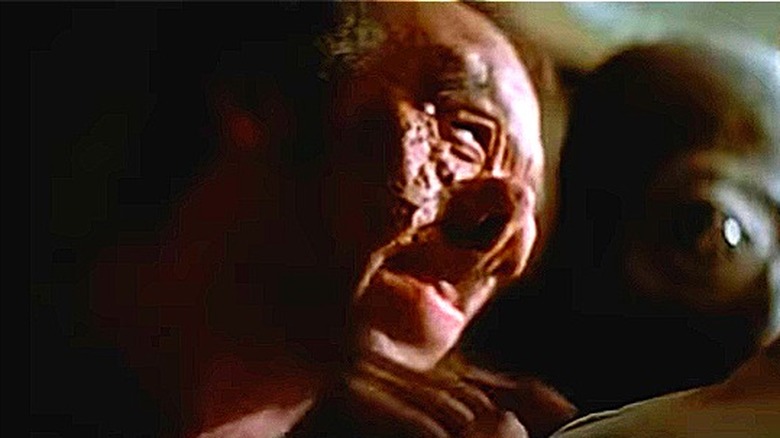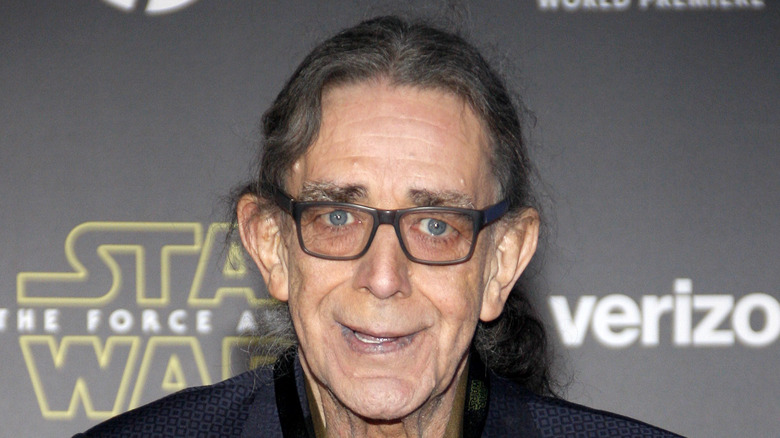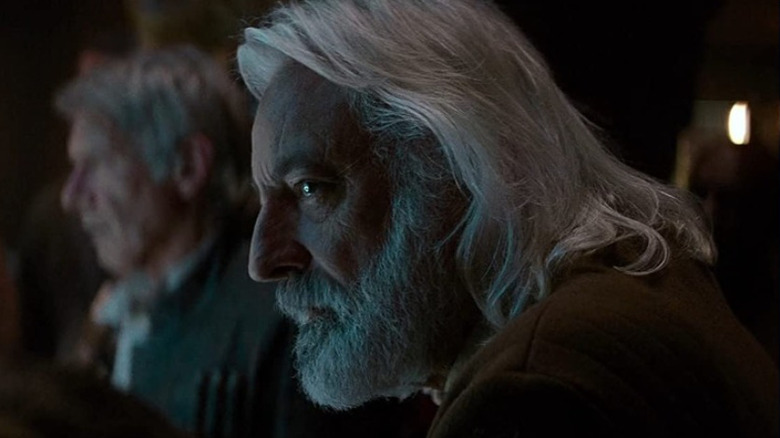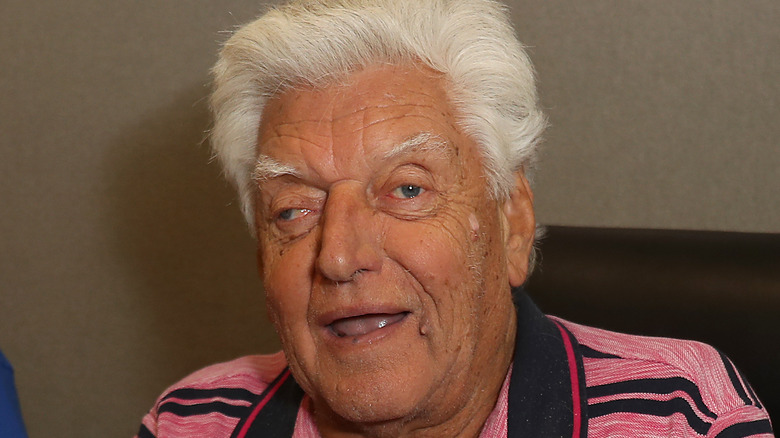We've Already Lost Too Many Star Wars Actors
The ever-expanding "Star Wars" film and television franchise all began when George Lucas' 1977 film "Star Wars" (re-titled "Star Wars: Episode IV — A New Hope") was released. It was a box office sensation and made $307.3 million (or $1.3 billion when factoring in inflation) in the U.S. alone, according to Entertainment Weekly. The success of the film demanded that Lucas take viewers back into his intergalactic world, and so two more films, which completed the original trilogy, were released in 1980 and 1983, respectively.
The fact is, there would be no "Star Wars" without George Lucas. However, when he followed up his beloved films with the controversial prequel trilogy, the franchise took a hit. Later, Lucas sold his production company, Lucasfilm, to Disney for $4.05 billion. Since taking over the franchise, Disney has released another trilogy continuing the central story, countless spinoff films, and a series of televisions shows, which have brought the universe into view of a whole new generation of fans.
The "Star Wars" universe and fandom have continued to grow, but its popularity has meant that its longevity has sadly outlasted some members of its cast. With the franchise spanning over 40 years, there are quite a few stars who are no longer with us.
Alex McCrindle
General Jan Dodonna first appeared in "Star Wars: Episode IV — A New Hope." Though his role in the film was fleeting, his character played an important part in the plot — Dodonna formulated the Rebellion's plan to destroy the Death Star. He was also the first character to say the franchise's most famous line: "May the force be with you."
The legendary general was played by Scottish actor Alex McCrindle. While "Star Wars" was one of his greatest acting roles, McCrindle is better remembered for setting up the Scottish National Committee of Equity in 1953, according to The Herald. "While highly regarded as an actor, he will be remembered most for his constant battles on behalf of his fellow actors. It is Alex's passion that will be missed most," said one tribute to him.
McCrindle sadly died April 20, 1990, at the age of 78. However, like his co-star Peter Cushing, the actor's "Star Wars" legacy lived on through "Rogue One: A Star Wars Story." While his character did return to the screen, though, it wasn't a result of CGI or unused footage. General Dodonna was recast and played by Ian McElhinney in the 2016 film.
Peter Cushing
In a galaxy far, far away, Grand Moff Wilhuff Tarkin plotted the fall of the Rebel Alliance from the comfort of the Death Star. The Imperial officer was played by British actor Peter Cushing, who famously wore slippers for most of his time on set.
One of Cushing's earliest roles was in the 1954 BBC adaptation of "Nineteen Eighty-Four." This, along with his performances in the 1968 BBC series "Sherlock Holmes" and Hammer's "Frankenstein" horror film series, put the actor on George Lucas' radar. "I wanted somebody really strong, a really good villain — and actually Peter Cushing was my first choice," the film's creator explained. Lucas also noted that he wanted someone with a human face to contrast the film's other villain, Darth Vader.
According to the Daily Star, Cushing was one of the highest earners on the set of "Star Wars: Episode IV — A New Hope," taking home £2,000 a day (about £13,240 today, or almost $15,000). His character died at the end of the film when Luke Skywalker blew up the Death Star, and the actor himself died less than two decades later, on August 11, 1994, The Independent reported. However, Peter Cushing's "Star Wars" legacy lived on through archival footage and CGI, which brought the character back to life for the 2016 film, "Rogue One: A Star Wars Story."
Sebastian Shaw
British actor Sebastian Shaw had a brief but memorable role in "Star Wars: Episode VI — Return of the Jedi," as the franchise's villain Darth Vader. Shaw appeared as the unmasked version of the character after taking over the role from David Prowse. Prowse had portrayed the character on-screen until that point, with James Earl Jones giving the villain a voice.
Shaw's role in the franchise came as a shock to many "Star Wars" actors and fans, who expected to see Prowse when Vader's mask was lifted. While some speculate it was because George Lucas fell out with Prowse, as detailed in The Sun, Shaw said he was cast for another reason. "They decided that they needed a very experienced actor to play that very difficult scene," he explained to Starlog magazine. What was required of him was particularly tough, according to the actor. "[The scene] wasn't easy to bring off ... incidentally, Mark [Hamill] nearly took my ears [off] with [the helmet]," he revealed.
Shaw largely disappeared from Hollywood after "Star Wars," but maintained a presence on British TV, according to his IMDb. He appeared in dramas like "Casualty," "Chelworth," and "Chimera," topping off an impressive career. He died on December 23, 1994, The Independent reported.
Don Henderson
Donald "Don" Henderson was a prolific television actor. He starred in a variety of classic British shows, including "Doctor Who," "Poldark," and "The Sweeney," per his IMDb. Henderson was already a well-known actor when he scored a part in "Star Wars: Episode IV — A New Hope" playing the Imperial officer, General Cassio Tagge. While appearing in the "Star Wars" franchise was a coup for most actors, Henderson didn't spend much time thinking about his small part. In fact, "by the time the film was released here in the UK (some many years after we had made it) I had totally, completely and absolutely forgotten that I was in it!" the actor revealed in a 1996 interview.
It wasn't until he was in the theater watching the film that he remembered his minor role. "I was surprised to see myself on screen, [then] my son stood up and yelled 'THAT'S MY DADDY!', resulting in the entire cinema audience turning round to stare at me," Henderson explained. While General Tagge did not die aboard the Death Star, Henderson did not reprise his role in any of the subsequent films.
The actor died on June 22, 1997, The Independent confirmed.
Jack Purvis
British actor Jack Purvis played multiple characters in the original "Star Wars" trilogy, as seen on his IMDb. He first appeared as Chief Jawa, leader of the Tatooine scavengers who sold R2-D2 and C-3PO to Luke Skywalker and his uncle Owen in " Star Wars: Episode IV — A New Hope." He returned for the sequels, playing Chief Ugnaught in "Star Wars: Episode V — The Empire Strikes Back" and Teebo the Ewok in "Star Wars: Episode VI — Return of the Jedi."
Playing Teebo was Purvis' most notable role in the franchise, and it became a family affair when his daughter, Katie Purvis, also suited up as one of the "teddy bear character[s]," per her own IMDb. Katie was only a teenager when she got the role, and while she admitted she didn't appreciate the opportunity back then, she and her family are now grateful for the experience.
Purvis also had a close friendship and working relationship with his "Star Wars" co-star Kenny Baker, which dated back to Purvis' first small-screen role, "Snow White and the Seven Dwarfs." The pair continued to work together off-screen, reported The Guardian. "Jack and I were the only musical dwarf act in the business, so we always attracted good audiences," Baker told the publication. Their act was tragically cut short when a "freak accident" — where Purvis' car collapsed on top of him — left the actor a quadriplegic. He died just a few years later on November 11, 1997, at the age of 60.
Alec Guinness
Sir Alec Guinness was one of the biggest names in the original "Star Wars" trilogy. The actor, who was known for "The Lavender Hill Mob," "Lawrence of Arabia," and "Doctor Zhivago," played the Jedi Master Obi-Wan "Ben" Kenobi, as seen on his IMDb.
However, while his character was an important part of the original trilogy, Guinness wasn't too fond of the role he played. He even begged George Lucas to kill off his character after a few weeks of filming. "I just couldn't go on speaking those bloody awful lines. I'd had enough of the mumbo jumbo," he said (per Entertainment Weekly). However, whether Guinness' pleas actually contributed to Lucas' decision to have Obi-Wan die in the film is unclear. And, while his character died in the first movie, Guinness still had to return for the second and third films as a spirit thanks to the power of the Force.
Guinness died from cancer-related complications on August 5, 2000, ABC News confirmed. Despite the actor's complicated relationship with the "Star Wars" franchise, his intergalactic legacy has remained strong in the years since his death. Guinness' voice was even used in the seventh film, "Star Wars: Episode VII — The Force Awakens," Time reported.
Shelagh Fraser
Sheila "Shelagh" Fraser was a prolific British actor who starred in a myriad of TV shows and was probably best known for her roles in the ITV dramas "A Family at War" and "The Professionals," per her IMDb. She also had a significant turn on the stage and — later in life — became a dramatist, after "she became fascinated by the challenges of radio drama," The Guardian wrote.
In the mid-1970s, Fraser landed what would become her most global role when she joined the cast of "Star Wars: Episode IV — A New Hope," as Luke Skywalker's aunt, Beru. Though her part in the film is short, Beru is undoubtedly an important character. As "The Princess Diaries" author Meg Cabot noted when discussing the essay she penned in "Star Wars: From a Certain Point of View" about Beru's importance, her murder shapes Luke's journey and character arc. Her death ultimately allows him to become the hero he was always meant to be. "The fact that she's not there anymore is what compels him to go with Ben Kenobi and, of course, save the princess and with her destroy the Death Star," Cabot said (per The Hollywood Reporter). The author even goes so far as to call Fraser's character "the most important" figure in "A New Hope."
Fraser died on August 29, 2000, at the age of 79, The Guardian reported.
Peter Diamond
Peter Diamond was the stunt coordinator for the original "Star Wars" trilogy, but he also had several minor roles in the franchise. "I have lost count of the number of roles I played in Star Wars," Diamond admitted, per starwarz.com. "All I can say is that my characters were all stunt related, like playing a Snowtrooper in The Empire Strikes Back when his gun exploded or a Stormtrooper in Star Wars [A New Hope] when Leia shot him off the top ledge in the Death Star," he explained.
Outside of his work in the "Star Wars" universe, Diamond was also known for choreographing the action on films like "Princess Bride" and the Harrison Ford-led "Raiders of the Lost Ark."
The actor and stunt coordinator sadly died on March 27, 2004. In a tribute to Diamond, published on his official website, his son, Frazer Diamond, acknowledged that a lot of his father's work went uncelebrated. "My father came from an era in which the film and television foot soldiers were rarely credited. Stunt work, in particular, was all smoke and mirrors. Nowadays it's front and center, celebrated as an integral part of the moviemaking magic," he wrote, noting that it was now his job to make sure his father's legacy is remembered.
Michael Sheard
Scottish character actor Michael Sheard had an incredibly prolific career and had roles in numerous television shows, per his IMDb. Though perhaps best known for playing villains, like the Imperial Officer Admiral Ozzel in "Star Wars: Episode V — The Empire Strikes Back" and "Indiana Jones and the Last Crusade" as Adolf Hitler (a role he played four other times, according to the BBC), he also secured bit parts and small character arcs on many series throughout his decades-spanning career. Notably, he appeared six times in "Doctor Who," playing multiple characters alongside five different Doctors.
He was more than just an actor, though. Sheard also wrote a series of autobiographies throughout his life, chronicling the details of what it meant to work as an actor. He wanted to name his second book "Yes, Admiral Ozzel," but after writing to George Lucas for permission to use the name, Sheard received a letter from "one of his underlings" who deemed his request inappropriate, per Television Heaven. The letter essentially told him he could mention he was in the film, but he shouldn't make that fact the focus of his book. "I wrote back to this guy, and I said, 'Look, I was only on the film for a month, so how on earth could I fill a whole book about Star Wars?'" Sheard quipped. He eventually named the book "Yes, Admiral."
The actor died on August 31, 2005, from cancer-related complications, The Guardian reported.
John Hollis
British character actor John Hollis had secured numerous television and movie roles throughout his long career, as seen on his IMDb. A veteran of both the small screen and the radio (per WhatCulture), he also had some memorable turns in films. Notably, he had an uncredited role as Ernest Stavro Blofeld in the James Bond film "For Your Eyes Only" (uncredited due to rights issues) and a Kryptonian Elder in the Christopher Reeve-led "Superman" franchise. Eventually, he landed one of his biggest movie roles, securing the part of Lobot, Lando Calrissian's aide in "Star Wars: Episode V — The Empire Strikes Back."
However, the mute cyborg was originally meant to be a very different character, which Hollis explained in an interview with Star Wars Insider (via starwarz.com). "Originally, Lobot had quite a lot of lines to read," the actor explained. "But they had a discussion where they decided it would be better if he didn't talk, because he had been lobotomized, and he was getting messages through the computer. The dialogue was just very much answering questions."
Hollis sadly died on October 18, 2005 at the age of 74, per his IMDb.
William Hootkins
William "Bill" Hootkins is a familiar face that can be spotted in numerous blockbuster films. The actor starred in movies like "Raiders of the Lost Ark" (where he played Major Eaton) and Michael Keaton's "Batman," (he secured the role of Eckhardt). He also had a supporting role in the fourth installment of Christopher Reeve's "Superman" franchise, as Harry Howler. The American-born actor moved to London shortly after graduating college, where he attended the London Academy of Dramatic Arts, and soon found himself often cast as Winston Churchill (per the Princeton Alumni Weekly). He also made a name for himself as Alfred Hitchcock in the West End, The Guardian reported.
One of Hootkins' earliest roles was Jek Porkins aka Red Six, in "Star Wars: Episode IV — A New Hope." He portrayed one of the rebel pilots who helped Luke Skywalker blow up the Death Star. Unfortunately, the Princeton alum only had a small role in the franchise and his appearance was contained to a few scenes on the rebel base and inside his fighter jet before the character was killed off. "If I had known Star Wars would catch on like it did, I would have insisted on a character with continuity," quipped the actor (via Princeton Alumni Weekly).
Sadly, Hootkins died from pancreatic cancer on October 23, 2005, at only 57 years old, reported The Guardian. He was survived by his wife of three months, Carolyn Robb.
Phil Brown
Actor Phil Brown played Luke Skywalker's uncle, Owen, in "Star Wars: Episode IV — A New Hope," a role he got in a unique way, reported Today. The American actor was making a name for himself in Hollywood after a fairly successful stage career when he got caught up in the "Red Scare" of the 1950s. During this time period, many actors were accused of being communists and black-listed from Hollywood, never to work again. While Brown always maintained he was never a part of the Communist Party, he nevertheless moved his family to London to avoid any further scrutiny. He found work in England, including a small part in "Star Wars," which he got because George Lucas stated he needed someone with a "strong American accent," per Today.
Though the character of Owen is integral to the film and "Star Wars" lore, the role wasn't a particularly big coup for Brown. It was "a very small part by comparison to the roles I had previously played," he admitted to the Baltimore Sun (via Today). "To be quite frank, I never gave it a thought again." However, despite Brown's attitude, the role undoubtedly helped his career reach new heights. Though his parts in films like "The Boy Cried Murder" and "Tropic of Cancer" may have been bigger, his turn as Uncle Owen in "Star Wars" made him an international celebrity.
Brown died on February 9, 2006, as a result of pneumonia. He was 89 years old.
Larry Ward
If you don't recognize the name Lawrence "Larry" Ward, you will certainly know the name of his "Star Wars" character: Jabba the Hutt. Although uncredited, Ward played the slug-like crime lord in "Star Wars: Episode VI — Return of the Jedi," per his IMDb.
However, this wasn't actually Ward's first part in the franchise. He previously voiced the character Greedo (also uncredited) in the famous Cantina scene of "Star Wars: Episode IV — A New Hope." The character was physically portrayed by Paul Blake, who discussed the popularity of the character 40 years later with Empire. "I've never had a fan be aggressive about Greedo. They seem to like him for some reason." However, Blake joked he doesn't know why the character is still so popular. "He was the most inept assassin since the beginning of assassins."
Ward's roles in "Star Wars" made up two of his few acting credits, though that small number of productions was probably by choice. He was actually a linguist who was enlisted for help designing some of the languages for the franchise by the films' sound designer, Ben Burtt, as seen in the book, "Encyclopedia of Fictional and Fantastic Languages." Most notably, they developed Huttese, basing it on Quechua, though Ward improvised much of the language while filming. The actor and linguist sadly died on October 15, 2007.
Richard LeParmentier
American character actor Richard LeParmentier played Admiral Motti in "Star Wars: Episode IV — A New Hope." However, the prolific actor and writer (per IMDb) actually rejected the first part he was offered in the franchise — a small one-liner that ended up being cut from the film. "A month later, I was offered Admiral Motti, which was obviously a great role. It's the first time the audience sees the Dark Side of the Force. I said yes a minute after I read the script," LeParmentier revealed to Star Wars Interviews.
His character is best remembered for criticizing Darth Vader's "sad devotion to that ancient Jedi religion." But his comments were not appreciated by Vader, and he used the power of the Force to choke the admiral, showing just what that religion could do. In the same way that some people can wiggle their ears, LeParmentier told Star Wars Interviews that he had particularly good control over the muscles in his neck, so he was able to move them to fake the look of being choked by the Force. "I suggested it to George [Lucas] and he loved the idea," the actor recalled.
LePamentier died on April 15, 2013, Entertainment Weekly reported, writing he "died suddenly at the age of 66." In a fitting tribute to their father and the character he played, LeParmentier's children noted in their statement about his death, "Every time we find someone's lack of faith disturbing, we'll think of him."
Christopher Malcolm
Scottish actor, director, and producer Christopher Malcolm played the rebel pilot Zev Senesca (Rogue Two) in "Star Wars: Episode V — The Empire Strikes Back." He's the pilot who rescued Luke Skywalker and Han Solo on Hoth and later fought alongside the young Jedi during the Battle of Hoth. "At the time of filming it was a growing phenomenon so there was a knowledge that we were in something special," Malcolm told Jedi News in 2006 (via The Independent).
Outside of the "Star Wars" universe, Malcolm was known for playing Brad Majors in the original stage production of Richard O'Brien's "The Rocky Horror Show" in 1974, and he later became a co-producer on the musical for its West End revival. He enjoyed a fairly long career, securing parts in "Labyrinth" and "Highlander" as well, per his IMDb.
Malcolm died from cancer-related complications on February 15, 2014, The Guardian confirmed, at just 67 years old. His daughter, Morgan Lloyd Malcolm, broke the news on Twitter, writing in part that "the world lost a beautiful, brilliant man" that day. She also called her father her "hero" and shared that he "left peacefully and with dignity."
Christopher Lee
Sir Christopher Lee was one of the biggest names in the "Star Wars" prequel films. The British star, who played Count Dooku, had already starred in the first installment of "The Lord of the Rings" trilogy, "The Fellowship of the Ring," which, in 2001, grossed over $880,000,000 worldwide, reported Box Office Mojo. Lee appeared in numerous Hollywood blockbusters, including the second and third installments of "The Lord of the Rings," and "Star Wars: Episode II — Attack of the Clones" and "Star Wars: Episode III — Revenge of the Sith." He also almost made it into another huge franchise, as he was contacted to play Albus Dumbledore in the "Harry Potter" films, though he turned it down.
While "Star Wars" was a notable credit for Lee, he stated that starring in "The Lord of the Rings" trilogy was a dream come true. "I always dreamed that it would one day be made, and I always dreamed I'd be in it," he said of the Tolkien story, per Total Film.
The actor had a prolific career spanning nearly seven decades, and he continued acting up until his death. In 2012, he reprised the role of Saruman in "The Hobbit" trilogy, and its last installment, "The Battle of the Five Armies," was his last film to be released in his lifetime. Lee died on June 7, 2015 at age 93, The Guardian reported, after facing complications from "respiratory problems and heart failure." Three more films that he starred in were released posthumously.
Jason Wingreen
Brooklyn character actor Jason Wingreen is probably better known for roles other than the one he had in "Star Wars: Episode V — The Empire Strikes Back." A hugely prolific television actor, as seen on his IMDb, Wingreen made a name for himself on shows like "All in the Family," "McMillan & Wife," and "Archie Bunker's Place." He continued working for almost 50 years, only retiring in the 1990s after appearing on the hit shows "Seinfeld" and "In the Heat of the Night," according to The Hollywood Reporter.
Though Wingreen was probably recognized for his numerous television appearances, he also had some parts that he didn't receive credit for, like when he lent his voice to the fan-favorite villain Boba Fett in "The Empire Strikes Back." (Wingreen's voice would later be replaced by Temuera Morrison, who portrayed Jango Fett in the "Star Wars" prequels, the BBC reported). Admittedly, this voice role was much smaller than the actor had hoped for, having originally auditioned for the part of Jedi Master Yoda. "I think the actual work, aside from the hellos and goodbyes and all that, could have been no more than 10 minutes," he revealed (per The Hollywood Reporter). In fact, the role was so small that it didn't become widely known that he was the voice of the character until the early 2000s.
Sadly, Wingreen's son told The Hollywood Reporter that his father died on December 25, 2015, at the age of 95.
Drewe Henley
British actor Gordon "Drewe" Henley was best known for his television roles, namely the BBC's adaptation of "Wuthering Heights," which aired in 1967, per his IMDb. A prolific actor who worked throughout the 1960s and '70s, Henley retired in the late '70s due to "his ongoing struggle with mental health issues" (later revealed to be Bipolar Disorder) and to focus on his marriage with fellow actor Felicity Kendal, according to The Times.
Before retiring, Henley nabbed a small part in "Star Wars," playing Garven Dreis, aka Red Leader in "A New Hope." This turned out to be his last role on film (he performed in one last TV movie before hanging up his acting hat for good), though he was inaccurately credited as Drewe Hemley. The opportunity to correct the crediting mistake came about in 2016 when Henley appeared in "Rogue One: A Star Wars Story" thanks to archival footage and CGI, reported IGN.
The actor sadly died on February 14, 2016, after he choked on the fish pie he had been eating for lunch, an inquest confirmed (per The Mirror). He was 75 years old.
If you or someone you know is struggling with mental health, please contact the Crisis Text Line by texting HOME to 741741, call the National Alliance on Mental Illness helpline at 1-800-950-NAMI (6264), or visit the National Institute of Mental Health website.
Erik Bauersfeld
Like Jason Wingreen before him, actor Erik Bauersfeld originally auditioned to play the Jedi Master Yoda in "Star Wars." The American voice actor just missed out on the part, which went to Frank Oz, but he ended up scoring two roles in the franchise instead. Bauersfeld played Admiral Gial Ackbar and Bib Fortuna in "Star Wars: Episode VI — Return of the Jedi." Ackbar may have only had a few minutes of screen time, but the character was responsible for delivering one of the film's most iconic lines. "It's a trap," yelled Ackbar, just in time to warn the Rebels about the Empire's attack.
Outside of his roles in "Return of the Jedi," Bauersfeld voiced characters in films like "Crimson Peak" and a variety of radio dramas, per his IMDb. This background helped him create Ackbar's voice without needing any direction. "I saw the face, and I knew what he would sound like," he explained in an interview with the San Francisco Chronicle.
Bauersfeld reprised his role from the 1983 film and played Ackbar again in "Star Wars: Episode VII — The Force Awakens." The Hollywood Reporter confirmed this was the actor's last film role before he died on April 3, 2016, at age 93.
Kenny Baker
Celebrated "Star Wars" actor Kenny Baker played R2-D2 in the original "Star Wars" trilogy, as well as the Ewok Paploo in "Star Wars: Episode VI — Return of the Jedi." He also reprised the role of the droid in "Star Wars: Episode VII — The Force Awakens," and played the character until his death. Though R2-D2 was probably his best-known character, it was far from his only one. According to his IMDb, Baker appeared in numerous other films and a few TV shows, including "Time Bandits" and "Willow," both of which saw him co-star alongside his fellow "Star Wars" actor, Jack Purvis.
While his turn as R2-D2 would become iconic, it almost never happened. To the surprise of most "Star Wars" fans, Baker initially turned down the role in the franchise. "I turned it down about three times ... I thought, 'Well, I'd rather not be stuck in a robot, to be honest,'" he said in an interview with The Hollywood Reporter. Thankfully, he changed his mind and became a prominent part of one of the world's most successful film franchises.
The actor, who was not supposed to survive to adulthood, died on August 13, 2016. He was 81 years old and had been "ill for years from a lung condition," according to CNN.
Carrie Fisher
Carrie Fisher was known for starring in iconic films like "When Harry Met Sally" and "Scream 3," but to many, she was simply Princess Leia. She played the strong and powerful princess-turned-general in the original "Star Wars" trilogy, and became a household name after the success of the films. However, she admitted she had a love-hate relationship with one of her most famous scenes. The actor often complained about the revealing gold bikini she was forced to wear, and said the scene was only redeemed for her because she got to kill Jabba the Hutt. "I really relished that because I hated wearing that outfit ... I couldn't wait to kill him," she told NPR.
Fisher reprised her role for the sequel trilogy and appeared in "Star Wars: Episode VII — The Force Awakens" and "Star Wars: Episode VIII —The Last Jedi." However, she died on December 27, 2016, before filming for the ninth movie had begun, People reported. She is survived by her daughter Billie Lourd, who played Lieutenant Connix in the films.
"Star Wars: Episode IX — The Rise of Skywalker" was supposed to be "Leia's movie," Lourd revealed to Time. So, together with director J.J. Abrams, Lourd agreed to use a combination of CGI and previously unseen footage to complete the film and honor Fisher's legacy.
Alfie Curtis
British star Alfie Curtis got his start on British TV shows like "Bowler" and "Larry Grayson," per his IMDb. However, it wasn't until he scored the role of Dr. Evazan in "Star Wars: Episode IV — A New Hope" — his second-ever film role — that Curtis garnered international recognition. Though uncredited, the success of "A New Hope" allowed Curtis to score parts on other popular TV shows like "Grange Hill" and "The Bill," as well as in feature films such as "The Elephant Man." Though he achieved some success, he retired from acting in the 1980s.
And while uncredited in his "Star Wars" role, he was still able to build up a significant fanbase from his time in the movie. In fact, he was able to count his friend and co-star Mark Hamill as one of his biggest supporters. "ALFIE CURTIS made the #StarWars Mos Eisley Cantina scene (one of the most memorable I've ever been a part of) even MORE memorable," Hamill wrote in part in a tribute to Curtis on Twitter. "As horrific as he was on-camera, off-camera he was funny, kind & a real gentleman."
Curtis sadly died on November 20, 2017, at the age of 87, per the BBC.
Peter Mayhew
Peter Mayhew rose to fame playing the Wookie Chewbacca in "Star Wars." The British-American actor played the character in the original trilogy and also reprised the role for the prequel film, "Star Wars: Episode III — Revenge of the Sith," and the first installment of the sequel trilogy, "Star Wars: Episode VII — The Force Awakens," per his IMDb. And while Chewie was a pretty important character in "Star Wars," it's interesting to note that Mayhew never actually uttered a word as the character. "George [Lucas] told me right away it was going to be a mime character," the actor revealed to Rolling Stone in 2015.
Much of Mayhew's career focused on the character he loved to play, and the actor spent a lot of his time going to conventions and doing cameos. Returning to the franchise in 2015 was particularly special, and he admitted he "had goosebumps" when first saw the trailer, which included Chewie returning to the Millennium Falcon again. "It was a phenomenal experience. And I won't ever forget it," he told Rolling Stone.
Mayhew died on April 30, 2019, after suffering a heart attack, at the age of 74. His long-time co-star and friend Harrison Ford shared a tribute to the actor shortly afterward. "We were partners in film and friends in life for over 30 years and I loved him," he said (per the BBC).
Andrew Jack
Actor and dialect coach Andrew Jack worked on a myriad of projects during his career, but one of his most notable jobs was working as a dialect coach on "The Lord of the Rings" films, teaching "Middle-earth accents" to the cast, Metro reported. He's also worked as a dialect coach with Pierce Brosnan for his role as James Bond in "GoldenEye" and with Robert Downey Jr. when the actor played Charlie Chaplin in "Chaplin."
In 2015, Jack joined the cast of "Star Wars." He played Major Caluan Ematt in the sequel trilogy, appearing in "Star Wars: Episode VII — The Force Awakens" and "Star Wars: Episode VIII — The Last Jedi." Jack put his dialect coaching background to good use on the set, working with Daisy Ridley and John Boyega on their accents for the films. He also lent his voice to the character Moloch in "Solo: A Star Wars Story."
On March 31, 2020, Jack died from coronavirus at the age of 76, per Metro. Mark Hamill shared his condolences to Jack's loved ones on Twitter. "I'm so sorry and saddened to hear we have lost Andrew Jack. He was such a kind gentleman who was deeply gifted & beloved by all who knew him," he wrote in part.
David Prowse
Any "Star Wars" fan will know the name David Prowse, as the British actor and bodybuilder played Darth Vader in the original trilogy. Though viewers don't get to see Prowse's face in the film, which is hidden behind Vader's signature mask, his impressive 6-foot-6-inch stature was one of his most notable features. And while fans loved him, Prowse didn't enjoy such a relationship with "Star Wars" creator George Lucas. Rightly or wrongly, Prowse was unfortunately on the receiving end of Lucas' wrath while filming "Star Wars: Episode VI — Return of the Jedi." This tension allegedly resulted in Prowse's face not being used when Darth Vader was unmasked, with the role being given to Sebastian Shaw instead. Lucas also allegedly banned Prowse from any further "Star Wars" premieres.
Thankfully, Prowse was still able to take many happy memories away from his "Star Wars" days, which included a fond friendship with his co-stars, Kenny Baker and Peter Mayhew, as seen on Twitter. Prowse also remained committed to his "Star Wars" fans and attended as many conventions and events as possible, usually alongside Baker and Mayhew. In 2012, the actor told Rock Cellar Magazine just how grateful he was for the support of his fans. "Who would have thought this character, who is now regarded as the most famous villain of all time, would be received with so much love and affection. It's incredible."
Prowse sadly died on November 28, 2020, at the age of 85, the BBC confirmed.

